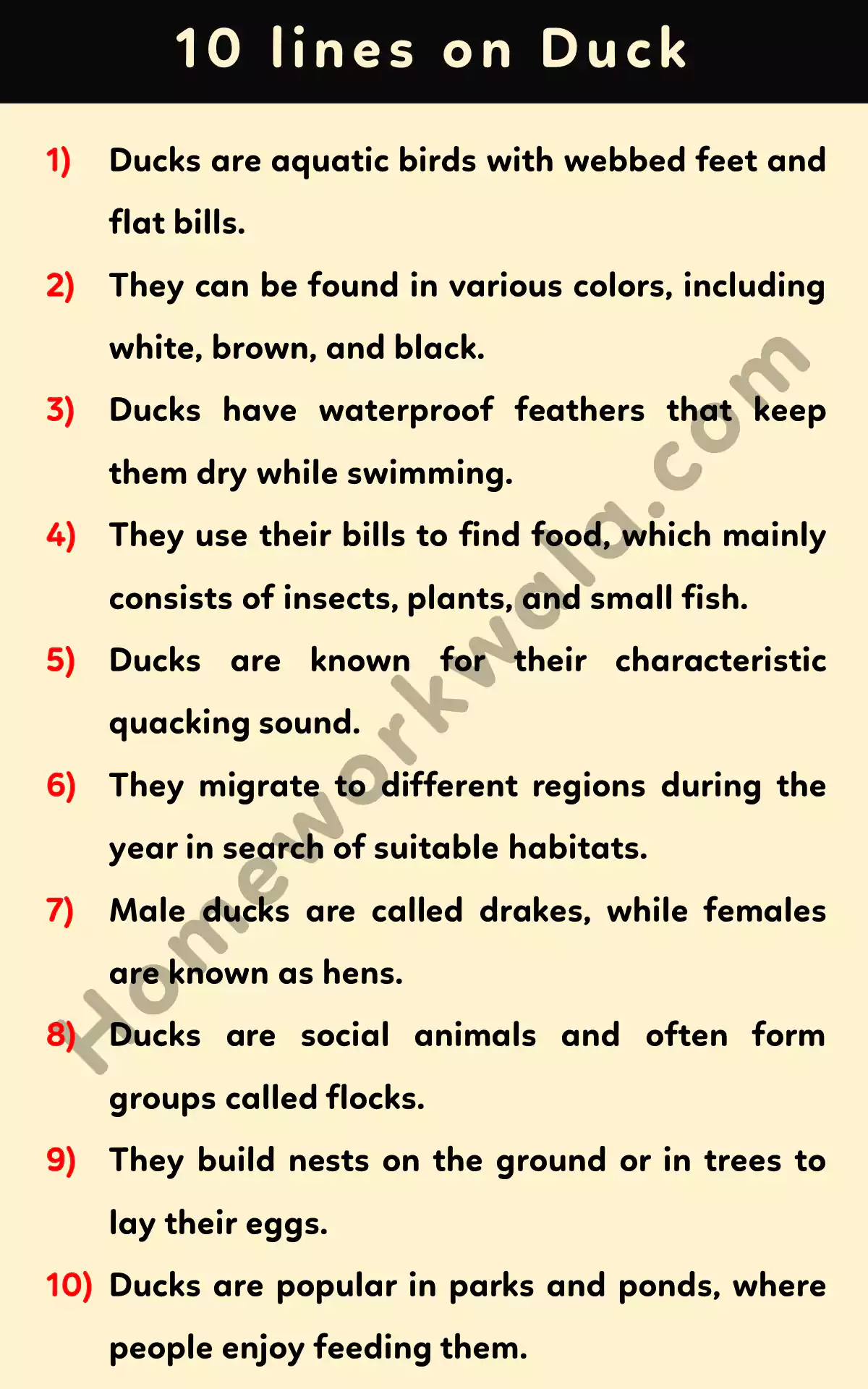Through this article, we are sharing 10 lines on Duck in English. This post will help those students who are looking for information about Duck in the English Language.
If any student wants to write a short essay on Duck then, this post is very useful for them. Information about Duck is very simple and easy for writing purposes.
These sentences on Duck are very short and easy to understand, so any level of student can write on this topic.

[ad1]
Table of Content
Set – 1
- 1. Ducks are aquatic birds with webbed feet and flat bills.
- 2. They can be found in various colors, including white, brown, and black.
- 3. Ducks have waterproof feathers that keep them dry while swimming.
- 4. They use their bills to find food, which mainly consists of insects, plants, and small fish.
- 5. Ducks are known for their characteristic quacking sound.
- 6. They migrate to different regions during the year in search of suitable habitats.
- 7. Male ducks are called drakes, while females are known as hens.
- 8. Ducks are social animals and often form groups called flocks.
- 9. They build nests on the ground or in trees to lay their eggs.
- 10. Ducks are popular in parks and ponds, where people enjoy feeding them.
You May Also Like
Set – 2
- 1. Ducks have a streamlined body that helps them glide smoothly on the water.
- 2. They have excellent vision and can see well both in water and in the air.
- 3. Ducks use their webbed feet for paddling and steering while swimming.
- 4. Some duck species can dive underwater to search for food.
- 5. Ducks have a layer of fat under their skin that helps keep them warm in cold water.
- 6. They have a unique gland near their tail called the preen gland, which produces oil to waterproof their feathers.
- 7. Baby ducks are called ducklings and are usually born with soft, fluffy feathers.
- 8. Ducks are omnivorous, feeding on a variety of plants, insects, worms, and small aquatic animals.
- 9. They are excellent flyers and can reach impressive speeds during migration.
- 10. Ducks play an important role in ecosystems by controlling insect populations and dispersing seeds through their droppings.
Set – 3
- 1. Ducks are skilled swimmers and can paddle gracefully on the water.
- 2. Their feathers provide insulation and help them stay buoyant.
- 3. Ducks have a specialized bill that allows them to filter food from the water.
- 4. They have a wide range of vocalizations, including quacks, honks, and whistles.
- 5. Ducks have a strong sense of hearing and can detect sounds both above and below water.
- 6. They have a natural instinct for migration, traveling long distances to find suitable breeding grounds.
- 7. Ducks form monogamous pairs during the breeding season and care for their offspring together.
- 8. Some duck species have vibrant plumage, displaying colorful patterns and iridescent feathers.
- 9. Ducks are adaptable and can thrive in various habitats, from ponds and lakes to rivers and marshes.
- 10. They are social birds and often engage in communal activities like preening and group feeding.

FAQ
Q. What do ducks eat?
Ans: Ducks eat a variety of food, including insects, plants, and small fish.
Q. How long do ducks live?
Ans: Ducks typically live for 2 to 10 years, depending on the species and environmental factors.
Q. Can ducks fly?
Ans: Yes, ducks can fly. They are excellent fliers and migrate long distances during certain times of the year.
Q. Why do ducks migrate?
Ans: Ducks migrate to find suitable breeding grounds and food sources as the seasons change.
Q. How do ducks stay warm in cold water?
Ans: Ducks have a layer of fat under their skin and waterproof feathers that help keep them warm in cold water.
Q. Where do ducks build their nests?
Ans: Ducks build their nests on the ground or in trees near water bodies, using twigs, grass, and down feathers for insulation.
We hope! You will get some learning through this article. If you really like this article about Duck in English, then please share it with your friends.
We working on helping the students to do their homework in a simple and easy way. Essay writing on Duck is generally asked the students in Schools.